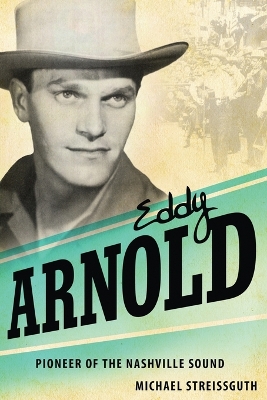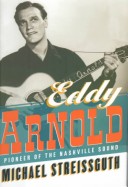American Made Music
4 total works
Fans of Arnold's mellow music will appreciate the intensely detailed record of his private life and public career. Others may find the vivid picture of country music's early decades (the many small-town radio stations and deejays that supported the music, the backroads tours, the struggling record labels) quite intriguing."" --Kirkus Reviews Illustrated with fifty-four photographs and featuring a comprehensive discography and sessionography, this book traces Eddy Arnold's origins from a cotton farm in western Tennessee to his legendary status in the world of country music. Michael Streissguth covers Arnold's success as a top-selling artist in the 1940s and 1950s and his temporary wane as listeners gravitated toward the rock & roll sound, embodied by newcomer Elvis Presley. Arnold (1918-2008) kept recording, however, and working on his craft. By the mid-60s, he reemerged as a pop crooner with his hit song ""Make the World Go Away."" His blend of country sentiments and pop stylings created the template for Nashville's modern country music sound. Throughout his career he was a major concert attraction and a radio and television star. Few other figures can claim to have had as great an influence on contemporary country and popular arranging.
On January 13, 1968, Johnny Cash (1932-2003) took the stage at Folsom Prison in Folsom, California. The concert and the live album, Johnny Cash at Folsom Prison, propelled him to worldwide superstardom. He reached new audiences, ignited tremendous growth in the country music industry, and connected with fans in a way no other artist has before or since.Johnny Cash at Folsom Prison is a riveting account of that day, what led to it, and what came after. Scrupulously researched, rich with the author's unprecedented access to Folsom Prison's and Columbia Records' archives, illustrated with more than 100 photos, Johnny Cash at Folsom Prison shows how Johnny Cash forever became a champion of the downtrodden, as well as one of the more enduring forces in American music.
Jazz as an instrument of global diplomacy transformed superpower relations in the Cold War era and reshaped democracy's image worldwide. Lisa E. Davenport tells the story of America's program of jazz diplomacy practiced in the Soviet Union and other regions of the world from 1954 to 1968. Jazz music and jazz musicians seemed an ideal card to play in diminishing the credibility and appeal of Soviet communism in the Eastern bloc and beyond. Government-funded musical junkets by such jazz masters as Louis Armstrong, Dave Brubeck, Duke Ellington, Dizzy Gillespie, and Benny Goodman dramatically influenced perceptions of the U.S. and its capitalist brand of democracy while easing political tensions in the midst of critical Cold War crises. This book shows how, when coping with foreign questions about desegregation, the dispute over the Berlin Wall, the Cuban missile crisis, Vietnam, and the Soviet invasion of Czechoslovakia, jazz players and their handlers wrestled with the inequalities of race and the emergence of class conflict while promoting America in a global context. And, as jazz musicians are wont to do, many of these ambassadors riffed off script when the opportunity arose.
Jazz Diplomacy argues that this musical method of winning hearts and minds often transcended economic and strategic priorities. Even so, the goal of containing communism remained paramount, and it prevailed over America's policy of redefining relations with emerging new nations in Africa, Asia, and Latin America.
Jazz Diplomacy argues that this musical method of winning hearts and minds often transcended economic and strategic priorities. Even so, the goal of containing communism remained paramount, and it prevailed over America's policy of redefining relations with emerging new nations in Africa, Asia, and Latin America.


